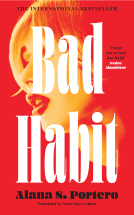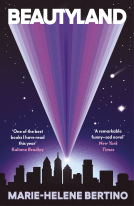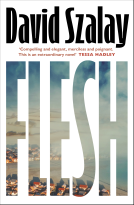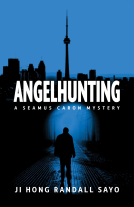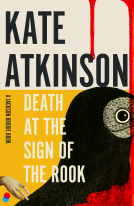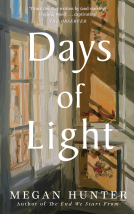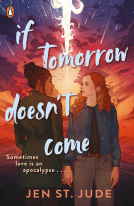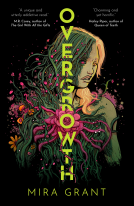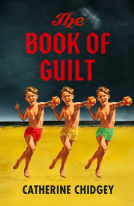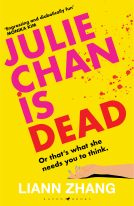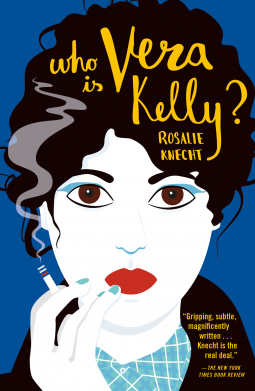
Who Is Vera Kelly?
by Rosalie Knecht
This title was previously available on NetGalley and is now archived.
Send NetGalley books directly to your Kindle or Kindle app
1
To read on a Kindle or Kindle app, please add kindle@netgalley.com as an approved email address to receive files in your Amazon account. Click here for step-by-step instructions.
2
Also find your Kindle email address within your Amazon account, and enter it here.
Pub Date 28 Jan 2021 | Archive Date 25 Jan 2021
Talking about this book? Use #WhoIsVeraKelly #NetGalley. More hashtag tips!
Description
New York City, 1962. Vera Kelly is struggling to make rent and blend into the underground gay scene in Greenwich Village. She's working night shifts at a radio station when her quick wits, sharp tongue, and technical skills get her noticed by a recruiter for the CIA.
Next thing she knows she's in Argentina, tasked with wiretapping a congressman and infiltrating a group of student activists in Buenos Aires. As Vera becomes more and more enmeshed with the young radicals, the fragile local government begins to split at the seams. When a betrayal leaves her stranded in the wake of a coup, Vera learns war makes for strange and unexpected bedfellows, and she's forced to take extreme measures to save herself.
An exhilarating page turner and perceptive coming-of-age story, Who is Vera Kelly? introduces an original, wry and whip-smart female spy for the twenty-first century.
Advance Praise
'Forget about 007. This heroine has her own brand of spycraft...' - Maureen Corrigan, Washington Post
'Gripping, magnificently written . . . This is a cool, strolling boulevardier of a book, worldly, wry, unrushed but never slow, which casts its gaze upon the middle of the last century and forces us to consider how it might be failing us still' - Charles Finch, New York Times Book Review
'The personal is most definitely political in Rosalie Knecht's crisp, lively and subversive second novel, Who Is Vera Kelly? . . . John le Carré and many other writers make hay with the personal repercussions of assuming false identity. Knecht flips the terms artfully, showing us a heroine who discovers her true tough self by going undercover' - Jean Zimmerman, NPR, “Best Books of 2018”
'Knecht’s novel is a slow-burn espionage thriller, a complex treatment of queer identity, and an immersive period piece all rolled into one delectable page-turner . . . Vera Kelly introduces a fascinating new spy to literature’s mystery canon―one we hope sticks around long beyond this snappy, intimate debut' - David Canfield, Entertainment Weekly
'Who Is Vera Kelly? is the twisty, literary, woman-driven spy novel you’ve always wanted to read' - Amy Stewart, New York Times bestselling author of Girl Waits with Gun
Available Editions
| EDITION | Paperback |
| ISBN | 9780857308108 |
| PRICE | £9.99 (GBP) |
Links
Featured Reviews
What has drawn me first to Rosalie Knecht’s ‘Who is Vera Kelly?’ was the cover – retro and atmospheric with the catchy title made me want to read this book, and I wasn’t disappointed.
Set in the 1960s, ‘Who is Vera Kelly?’ follows young Vera, a woman in her twenties, who after many wrong choices and messy events, gets recruited by CIA and sent on a mission to Argentina, in the middle of political upheaval. She is tasked with befriending and spying on a group of students in Buenos Aires, who presumably are being recruited for KGB.
‘Who is Vera Kelly?’ has double-narrative – we follow Vera both on her assignment, but w also get short glimpses into Vera’s background. While interesting, I didn’t necessarily feel like I needed that much of Vera’s backstory, at least not in this form, but on overall, I have enjoyed the writing style a lot.
What I liked the most about Rosalie Knecht’s book was how character-driven it was. Most thrillers and mysteries are fast-paced narratives focusing predominantly on the action. ‘Who is Vera Kelly?’ though full of events and often extremely dangerous and stressful situations for the main character, is slower, more focused on Vera herself – exploring her journey, her thoughts and feelings. In many ways, Rosalie Knecht’s is more literary than most books from the genre, but it is something I have enjoyed here very much. It has added another layer to the atmosphere of the book – both the setting and the character had felt more alive as a result.
 Reviewer 203820
Reviewer 203820
After a turbulent youth, the break-up with her mom, some time in a detention centre and no plan what to do with her life, Vera ends up in New York, trying this job and that job. One day, she is addressed by a man who noticed her quick wits and technical understanding. He is a recruiter for the CIA and thus, a couple of years later, Vera finds herself in Buenos Aires with the fake ID of a Canadian student named Anne. Her mission: spy on a group of students who the CIA believes to work for the KGB in order to ally Argentina with the Soviet Union. Vera/Anne makes befriends Ramón and Victoria who have radicalised and are disappointed by how the country is governed. Yet, then suddenly, the military ventures a coup d’état and General Onganía’s men take over. Vera/Anne is stuck, foreigners are not allowed to travel anymore, her local contact betrayed her and she gets the runaround by her superior within the CIA. Either she acts for herself, or she is lost.
“Who Is Vera Kelly?” is not an easy to classify novel. It is a kind of bildungsroman, we get to know young Vera who protests against her mother and school and has to grow up the hard way. A young woman who is looking for her place in life and oscillates between different options without a clear aim. On the other hand, the novel is a political or spy crime novel since we have Vera/Anne prying on rebellious students to uncover any KGB involvement in Argentina and also the time after the Revolución which brings the military dictatorship and severe restrictions for the people.
At both times of her life, Vera is lonely, her affection for her school friend is not returned and also when she arrives in New York does she not find a person to really bond with. This qualifies for a lone spy job abroad where she is left to her own devices and cannot really build deep friendships. The experiences she made as a teenager, especially with her mother who kicked her out into the detention centre and did not show any interest in her, gave her quite a good education for her mission.
Vera is not a classic heroine, she is no James Bond and does not compare to any other dazzling movie character. She is actually the perfect spy, she blends in smoothly, goes unnoticed and her technical skills allow her even without any sophisticated equipment to get the information she needs. When she finds herself deserted of all contacts and help, she is close to breaking down but then shows her real strength. She just goes on and finds a solution to escape.
A perfect blend of a young woman who is far ahead of her time in terms of emancipation and going her own way and a world in political turmoil. The plot becomes increasingly suspenseful and thus is a real page-turner.
 Account D, Media/Journalist
Account D, Media/Journalist
In the back of my copy of Who Is Vera Kelly? is one of those question sets designed to guide a reading group. One of the questions which caught my eye was ‘Lots of girls grew up reading Harriet the Spy and Nancy Drew novels. Why do you think there are so few adult spy novels starring female spies?’.
It is a good question and the reason I was drawn to it is because the experience of reading Who Is Vera Kelly? was a very unusual one; firstly because there are so few female spies in adult novels, and because there are even fewer queer ones. In Who Is Vera Kelly?, Rosalie Knecht has created a world that manages to feel very familiar whilst also being fresh and exciting merely by who her main character is.
Who Is Vera Kelly? follows our eponymous hero on her first big mission in 1960s Beunos Aires, as she attempts to root out a KGB plot in the tumultuous Argentine political scene, all whilst posing as a Canadian student. Interspersed with these scenes are flashbacks to her life leading up to how she was recruited to the CIA, highlighting her poor relationship with her mother and the friendship with Joanne which seems to have been the main driver in many of the decisions Vera made along the way. It’s a relatively simple plot, not overly complicated as a lot of spy novels can be, but no less of a page turner because of it.
Where Knecht’s real strength lies though is creating the world of her novel. When I was younger, I was devoted to Graham Greene, and Who Is Vera Kelly? gave me a lot of the same vibes as reading his work. The sense of place is very strong, with sharp observations of Argentine life and the people who surround Vera. It is immersive writing in the very best way; not over descriptive, sketching in just enough details to paint a picture without being flowery. Knecht handles the world through Vera’s eyes as though she has been doing it for a long time.
And of course, what is really a bit of a revelation is that we are looking through Vera’s eyes at all. As the reading guide question says, there are not many novels like this with female protagonists, especially written in this way which seemingly deliberately invokes the tone of some of the very best spy novels of the past. The reason that this world feels familiar to me is because of the legacy of literature in which Who Is Vera Kelly? can fit, but the freshness comes from Vera being a woman, and being queer too.
In fact, I would say that more of Vera’s character comes from being queer than it does from being a woman. She knows how to negotiate the world as a woman; she is self-assured and confident. We could have been easily treated to any number of scenes in which Vera is forced to be afraid of the men around her, but I can’t think of a single time that happened in this novel. She glides through even the most dangerous situations at least appearing to be in control to the people around her.
No, Vera’s true struggle comes in her sexuality. She is afraid to find the underground gay scene in Beunos Aires because that is the thing that could leave her open and vulnerable if anyone finds out. In the flashback scenes, we watch a young Vera first discover and then explore her sexuality. She is very much enduring the early queer experience of not knowing why she is so sad to be separated from her friend, or wondering why her letters to the same friend look like love letters.
The thing that makes Who Is Vera Kelly? such a great read is that we need queer stories exactly like it. Coming out stories have their place, of course, but we are in desperate need always of stories which do not have sexuality or gender identity as the main focus, but rather as part of the rich tapestry of a character, just as in novels with cishet main characters. By invoking these old classic spy thrillers in her tone and world building, but introducing a character who is a queer woman to explore it, Knecht has done a great job of providing exactly one of these highly necessary stories.
I thoroughly enjoyed this book.
I expected the book to start in NYC, because the summary says so, but the book actually jumps back and forth between Vera's teenage years up to her NYC move and the "newer" (1965/1966) time line.
Vera is in Argentina for the CIA trying to sniff out communists.
I loved Vera as a protagonist, and was very disheartened by the reality of a lesbian woman in the 60s who could be fired just for loving who she loved. I know it's still not the case everywhere in the world and that is so so sad.
I would recommend this to anyone who loves a good spy-novel. During this unending epidemic, it's so lovely to be able to travel through books.
It's a historical novel, though I am not familiar with Argentina in that time, so I can't say if it's accurate but from what I googled it seemed to be.
The book made me want to read the sequel straight away, which in a different way maybe was even better.
<i>3.75</i>
<b> Thank you to the publisher for allowing me to read an e-Arc of this book on NetGalley! </b>
<i>Who Is Vera Kelly? </i> is a spy thriller following Vera Kelly, a young adult on a mission in Argentina, attempting to blend in with the gay student crowd and work surveillance on the uprising on the horizon. Despite being described as a thriller, this novel is - in my opinion - more of a character piece, it's more about seeing how Vera acts and works whilst maintaining her cover; reminiscent of the style of </i> The Seven Husbands of Evelyn Hugo</i>.
The book is told in dual timelines, the 1966 Argentina and flashbacks to Vera's childhood, which I found to be extremely interesting and gave Vera such depth and connection. Seeing the ways in which her young romances echoed her later decisions was perfectly done. The whole cast of characters was really interesting, particularly Victoria - the only thing I would have loved to see is some of Victoria's POV, I think that would have been really interesting.
As someone who doesn't typically read spy-related novels, I found <i>Who Is Vera Kelly? </i> to be a perfect entry into the genre, bridging the gap between dramatic fiction and the high-action spy thrillers you might expect.
I would highly recommend this book for readers looking to enter the spy-thriller genre, and fans of the style of The Seven Husbands of Evelyn Hugo.
This is an enjoyable, well-written novel about Vera Kelly, a surveillance operative in Argentina in 1966. Told with a timeline in the present and one starting around a decade earlier and closing the gap between then and the present story.
There were some lovely descriptions in the novel, and I found Vera to be a memorable protagonist. Smart but not able to do much about some of the situations she finds herself in, a bit heartless when necessary but ultimately a resourceful and talented woman. She finds herself drawn to emotionally unavailable women for a lot of this novel and her first visit to an underground lesbian bar in New York is skillfully rendered showing a woman who wants to fit in but doesn't quite know how to go about it.
Thanks to netgalley and the publisher for a copy of the novel in exchange for an honest review.
Vera Kelly is posing as a Canadian student in Buenos Aires in 1966, but she is actually working for the CIA, monitoring the regime for alleged KGB links. She is using her technical skills to plant bugs and monitor conversations, and forming relationships with students who are suspect. However, when the coup that everyone is expecting comes, here escape does not go to plan and she is forced to improvise.
While most of the plot of Who Is Vera Kelly? occurs in the Buenos Aires story, there are alternating chapters giving vignettes of her life from adolescence in the US up to the point that she travels to Argentina. These show the genesis of Vera Kelly as spy, as she comes to terms with a troubled family history and her growing awareness of her attraction to women.
I love the distinctive voice in this novel. The writing is beautifully understated. There are also some wonderfully atmospheric descriptions of Buenos Aires and of Vera’s time in New York, struggling to connect to the lesbian scene. You see how her earlier struggles to blend in have shaped her ability to adopt different personas as a spy, and her intuitive grasp of the loneliness and sense of estrangement of others.
I think it will appeal more to literary than thriller readers. While Vera does demonstrate her tradecraft, there aren’t any major twists or revelations, either in personal or political terms. The second half of the novel, when the tension should have ramped up, actually felt less interesting. I was also left with one or two questions about the plot. However, there is a growing sense of the cruelty and absurdity of the players across the political divide.
Who Is Vera Kelly? is a literary coming-of-age story, told with spare, stylish prose and a vivid sense of period and place. There is now a second novel, Vera Kelly is not a Mystery, in which she becomes a private investigator in New York. While this book doesn’t obviously feel like a series opener, I’d be interested to see where Vera Kelly goes next.
*
I received a copy of Who Is Vera Kelly? from the publisher via Netgalley.
"I lived for nearly a decade as if I had come from nowhere. But there are so many ways to cross a border."
Set in two timelines, we follow both Vera's past in New York City, as she moves away from her family home, integrates herself into New York's underground gay scene, and works nights at a local radio station, and then her life in Argentina as a spy for the CIA in the 60s - wiretapping congressmen and infiltrating a group of student radicals as a governmental coup becomes more likely.
What I Liked:
- Easy read, kept my attention.
- Although it was about the lead-up to the Cold War, and my historical knowledge is poor, it was written in a very accessible way - it never felt boring or condescending or info-dumpy.
- The exploration of sexuality between the 50s and 60s was interesting - if sad.
- The writing was atmospheric throughout - I felt like I could see Buenos Aires.
- The tension in the latter half was excellent.
What I Didn't Love:
- Sometimes the writing style felt overly simplistic. While I definitely appreciated it at times (war-stuff, am looking at you), at other times it felt a little too simple.
- I wish the flashbacks were longer - I wanted more about Vera coming of age, the exploration of her sexuality, and of her being recruited by the CIA.
Overall this was a well-paced, engaging, sapphic spy novel. I loved Vera, I loved the setting. The conclusion is action packed and you'll feel like you've been holding your breath for the last 50 pages - the stifling and 'stuck' situation is written so well. Would definitely recommend.
Big thanks to NetGalley, the author, and Verve for the eARC. I believe this one's been out in the US for a while, but it's now available to purchase in the UK too!
Let me just begin with saying that is you liked Atomic Blonde, you'll like this book. It's a spy novel set in the period of history, in which all the coolest spy stories are set-- the Cold War. This time it's not Berlin, but Buenos Aires. I don't know how accurate the descriptions of the city are, I've never been, but it didn't seem to be exoticized, which is always a great start.
The main character is Vera, a mysterious and badass American operative, who describes herself as left wing and who has a mysterious past involving a suicide attempt and possibly a girl.
It's one of those books that are exactly what they are supposed to be. And I can appreciate that. The title poses a question and the story answers it.
The current events--and when I say current, I mean happening in Argentina in 1966--are mixed with flashbacks from late 1950s and early 1960s America, through which Vera's past is explaine. Those flashbacks slowed the novel down, but I didn't mind--they offered insight into who Vera is and that was ultimately the point of the book--discovering who she is. The book is extremely slow-burn, so don't expect to find out until you reach the last page.
And there are book club questions at the end of the book! I always appreciate that, because such a simple thing makes some book club organizer's job easier.
All in all, it's a solid 4,5-star read. Maybe even 5. I liked it 👍👍👍
I really enjoyed reading this little novel about a lesbian spy in the 50s/60s. There were some great characters and the scenes were quite vivid. The gayness wasn't too overt that it becomes lesbian erotica but was subtle enough to be enjoyed by a WLW such as myself!
My only critique would be that the actual plot wasn't as pronounced or clear as it should have been. We vaguely begin to understand why Vera is in Argentina, but the story wasn't quite fully fleshed out. It left me wondering a bit about why she was chosen and was there.
However, overall, a thoroughly enjoyable book and would recommend to anyone looking for an easy read!
 Amanda W, Reviewer
Amanda W, Reviewer
I thoroughly enjoyed this exciting and refreshing book. Totally different to my usual style but a great read all the same.
 Jessica J, Reviewer
Jessica J, Reviewer
I really enjoyed this - I went in with no expectations, and it was very nearly a 5 star read for me. It scratched a very particular itch - when I was going through my Le Carre obsession (did it ever stop?) I searched desperately for a female-led, queer espionage story. My searching at the time was unfruitful - I'm very glad that that is no longer the case.
The scenic descriptions are really visceral - as are the representations of food (this made me hungry several times).
The only downfall is that, although it's 240 pages, Who Is Vera Kelly? reads almost like a novella - it feels short. This does lead to some pacing issues.
Overall, I was enthralled by Vera, and hearing her story. I've already pre-ordered the sequel, and can't wait to see what our heroine gets up to next.
Who is Vera Kelly? is a spy novel with a difference - one where you really get to know the character and delve into an unhappy family history. Rosalie Knecht gives us a convincing Cold War scenario with a naive operative spying on government officials and radical students in Bueno Aires in the time leading up to a military coup. With her CIA handler far away and no friends in a politically volatile city, Vera is alone and in danger, with no-one to trust. What happens after the coup is a surprise to her and to the reader. Vera is a compelling queer heroine and I'm happy to learn that there is a sequel to this book as I'm keen to know what she does next.


